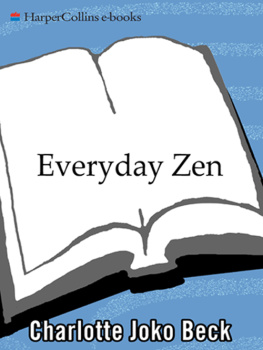Charlotte Joko Beck - Everyday Zen - Love and Work
Here you can read online Charlotte Joko Beck - Everyday Zen - Love and Work full text of the book (entire story) in english for free. Download pdf and epub, get meaning, cover and reviews about this ebook. year: 0, publisher: HarperCollins, genre: Religion. Description of the work, (preface) as well as reviews are available. Best literature library LitArk.com created for fans of good reading and offers a wide selection of genres:
Romance novel
Science fiction
Adventure
Detective
Science
History
Home and family
Prose
Art
Politics
Computer
Non-fiction
Religion
Business
Children
Humor
Choose a favorite category and find really read worthwhile books. Enjoy immersion in the world of imagination, feel the emotions of the characters or learn something new for yourself, make an fascinating discovery.
- Book:Everyday Zen - Love and Work
- Author:
- Publisher:HarperCollins
- Genre:
- Year:0
- Rating:4 / 5
- Favourites:Add to favourites
- Your mark:
- 80
- 1
- 2
- 3
- 4
- 5
Everyday Zen - Love and Work: summary, description and annotation
We offer to read an annotation, description, summary or preface (depends on what the author of the book "Everyday Zen - Love and Work" wrote himself). If you haven't found the necessary information about the book — write in the comments, we will try to find it.
Everyday Zen - Love and Work — read online for free the complete book (whole text) full work
Below is the text of the book, divided by pages. System saving the place of the last page read, allows you to conveniently read the book "Everyday Zen - Love and Work" online for free, without having to search again every time where you left off. Put a bookmark, and you can go to the page where you finished reading at any time.
Font size:
Interval:
Bookmark:
Love and Work

Beginnings
Practice
Feelings
Relationships
Suffering
Ideals
Boundaries
Choices
Service
Successful living means functioning well in love and work, declared Sigmund Freud. Yet most Zen teaching derives from a monastic tradition that is far removed from the ordinary world of romantic and sexual love, family and home life, ordinary jobs and careers. Few Western students of Zen live apart in traditionally structured monastic communities. Most are preoccupied with the same tasks as everyone else: creating or dissolving a relationship, changing diapers, negotiating a mortgage, seeking a job promotion. But the Zen centers that serve such students often retain an aura of esoteric specialness and separateness. Black robes, shaved heads, and traditional monastic rituals may reinforce the impression of Zen as an exotic alternative to ordinary life, rather than ordinary life itself, lived more fully. Because the images and experiences of classical Zen arose out of monasticism, classically trained teachers of Zen are not always able to speak to the actual life issues of their twentieth-century Western students. They may unwittingly encourage an escapist response to those issues, a retreat from problems of real life under the guise of seeking special, overwhelming experiences. If Zen is to become integrated into Western culture, it requires a Western idiom: Chop wood, carry water must somehow become, Make love, drive freeway.
Yet so long as people seek to awaken to themselves and to their life as it isto the immediacy of this very momentthe spirit of Zen will appear. On a quiet side street of a San Diego suburb, in a small and unprepossessing tract home, just this noiseless burgeoning is under way. Exploring ordinary human relationships, unraveling the dilemmas of career and ambitionbringing Zen to love and workis the core of an amazingly pure and lively Zen* as taught by Charlotte Joko Beck.
Joko Beck is an American Zen original. Born in New Jersey, educated in public schools and at Oberlin Conservatory of Music, Joko (then Charlotte) married and began to raise a family. When the marriage dissolved she supported herself and her four children as a teacher, secretary, and later as an administrative assistant in a large university department. Not until well into her forties did Joko begin the practice of Zen, with Maezumi Roshi (then Sensei) of Los Angeles, and later with Yasutani Roshi and Soen Roshi. For years she commuted regularly from San Diego to the Zen Center of Los Angeles (ZCLA). Her natural aptitude and persistent diligence enabled her to progress steadily; and she found herself increasingly drawn into teaching, as other students recognized her maturity, clarity, and compassion. Joko was eventually designated Maezumi Roshis third Dharma Heir and, in 1983, she moved to the Zen Center of San Diego, where she now lives and teaches.
As an American woman whose life was well formed before she began to practice, Joko is free from the patriarchal trappings of traditional Japanese Zen. Devoid of pretension or self-importance, she teaches a form of Zen that manifests the ancient Chan principle of wu shih nothing special. Since moving her practice to San Diego, she no longer shaves her head, and seldom uses robes or her titles. She and her students are evolving an indigenous American Zen that, while still rigorous and disciplined, is adapted to Western temperaments and ways of life.
Jokos dharma talks are models of incisive simplicity and tart common sense. Her own lifetime of personal struggle and growth and her many years of responding with matter-of-fact compassion to her students traumas and confusions have generated both uncommon psychological insight, and a teachers gift for apt phrases and telling images. Her teaching is highly pragmatic, less concerned with the concentrative pursuit of special experiences than with the development of insight into the whole of life. Vividly aware that powerful spiritual openings that are artificially induced do not insure an orderly and compassionate life (and may even be harmful), Joko is skeptical of all muscular efforts to overpower ones resistance and find shortcuts to salvation. She favors a slower but healthier, more responsible development of the whole personality, in which psychological barriers are addressed rather than bypassed. One of her students, Elihu Genmyo Smith, reflects her thinking in his description:
There is another way of practice, which I call working with everything, including emotions, thoughts, sensations, and feelings. Instead of pushing or keeping them away with our mind like an iron wall, or boring through them with our concentration power, we open ourselves up to them. We develop our awareness of what is occurring moment by moment, what thoughts are arising and passing, what emotions we are experiencing, and so on. Instead of a narrow focused concentration, broad awareness is our concentration.
The point is to become more awake to what is occurring inside and outside. In sitting we sense what is, and we allow it to go on, not attempting to hold it, analyze it, or push it away. The more clearly we see the nature of our sensations, emotions, and thoughts, the more we are able to see through them naturally.
Operating from a perspective of equality, Joko sees herself as a guide rather than a guru, refusing to be put on a pedestal of any kind. Instead, she shares her own life difficulties, thereby creating a humane environment that empowers her students to find their own way.
The selections included here are edited versions of informal talks recorded during intensive meditation retreats or regular Saturday morning programs. In them Joko frequently refers to zazen , the traditional Zen meditation, simply as sitting. Sangha is the Buddhist term for the congregation or community of persons who practice together; the Dharma may be approximately translated as Truth, learning, or right living. The retreats, called sesshin (from the Japanese for to connect the mind), last from two to seven days and are conducted in silence, except for essential communication between teacher and student. Beginning in the early morning hours of each day, with eight or more hours of sitting plus meditative work practice, such retreats are both difficult personal challenges and potentially powerful processes of awakening.
Joko has little patience with romanticized spirituality, idealized sweetness and light that seeks to bypass reality and the suffering it brings. She is fond of quoting a line from the Shy Rku: From the withered tree, a flower blooms. Through living each moment as it is, the ego gradually drops away, revealing the wonder of everyday life. Joko travels this path with us, and her words, extraordinary in their very ordinariness, help to point the way: elegant wisdom in plain clothes.
Numerous students and friends of Joko have eagerly supported the creation of this book, helping to make my own work a labor of love. Generations of anonymous typists who first transcribed Jokos talks into written form deserve much credit; though I cannot begin to thank all of them, they know who they are. In the early stages of planning Rhea Loudon offered important encouragement, and has provided key support throughout. Conversations with Larry Christensen, Anna Christensen, Elihu Genmyo Smith, and Andrew Taido Cooper helped to shape the book; I am grateful for their knowledgeable support. Arnold Kotler of Parallax Press offered generous counsel and astute advice at another critical juncture. Elizabeth Hamilton, who for years has sustained the day-to-day operations of the Zen Center of San Diego with an extraordinary commitment of time, energy, and love, deserves warm thanks for her contributions. My colleague, Christopher Ives, has been an important source of scholarly information and moral support. Professor Masao Abes thorough knowledge of sources aided me in the final stages of preparation. Pat Padilla has provided rare secretarial service, typing and retyping the manuscript rapidly and impeccably, always with cheerful helpfulness and interest; her contribution is central. Lenore Friedmans fine informal picture of Joko and her teachings, in Meetings with Remarkable Women: Buddhist Teachers in America (Boston and London: Shambhala, 1987) was helpful to me in writing the Preface.
Font size:
Interval:
Bookmark:
Similar books «Everyday Zen - Love and Work»
Look at similar books to Everyday Zen - Love and Work. We have selected literature similar in name and meaning in the hope of providing readers with more options to find new, interesting, not yet read works.
Discussion, reviews of the book Everyday Zen - Love and Work and just readers' own opinions. Leave your comments, write what you think about the work, its meaning or the main characters. Specify what exactly you liked and what you didn't like, and why you think so.













